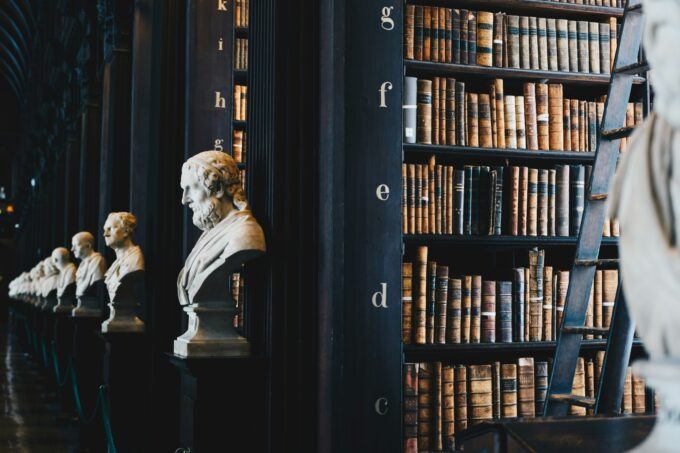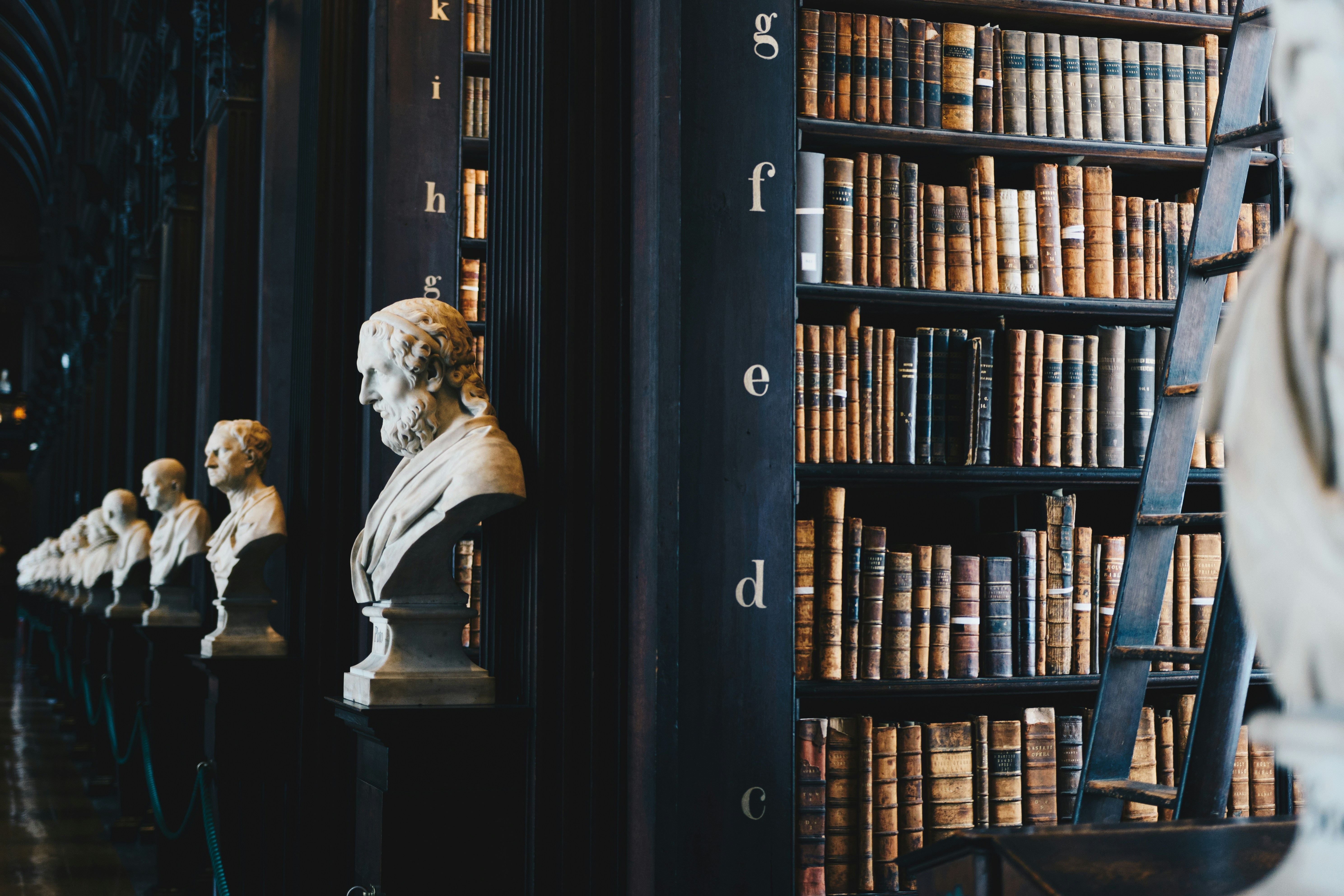






























































Image by Giammarco Boscaro.
On April 18, 2024 the Truman Presidential Library held its premier fund-raising event, an awards dinner called “Wild About Harry,” at a downtown Kansas City hotel.
It was the 25th anniversary of “Wild About Harry,” which a press release by the Truman Library Institute says is “now a Kansas City tradition … known for bringing out our nation’s thought and opinion leaders to the site that once served as President Truman’s political headquarters.”
The gala dinner occurred 75 years after the founding of the state of Israel and the accompanying expulsion of approximately 750,000 Palestinians from their homeland, an event Palestinians call the Nakba. Many of the descendants of those 1948 refugees live in Gaza, a fact that went unmentioned at the dinner as did the six-month-old war taking place there. Even before the war, the large protests spawned within Israel by the right-wing government’s proposed judicial overhaul might have curbed the fulsome accolades to President Truman for his decision not quite 76 years before to immediately recognize the new state. In 2024 the sole mention of Israel was a comment made by the recipient of the Harry S. Truman Legacy of Leadership award, Senator Roy Blunt. Recently retired from the U.S. Congress, Senator Blunt recounted that then-Secretary of State George Marshall had told Truman that he was so opposed to the United States recognizing Israel he would not vote for him in the upcoming presidential election if Truman did so. While Truman had great respect for General Marshall, a man recognized for both his wartime leadership and his integrity, Blunt added that Truman went ahead and “did the right thing.”
No one in the audience demurred, though at least some might have wondered if Truman did do the right thing or if the Middle East wouldn’t have been better-served if Truman had heeded his secretary of state’s counsel. But it was not that kind of evening nor that kind of crowd. Many dressed in evening wear, the 800 or so guests in the ballroom rose to their feet to applaud every speaker. It was up and down all all night, first to stand for the singing of The Star-Spangled Banner, then for the introduction of the sponsors of the evening, then for the honorary chairman, then for his conversation with Roy Blunt, then for Truman’s grandson, Clifton Daniels, who delivered some humorous slightly off-color remarks, then for writer Evan Thomas, who delivered the keynote address. The atmosphere was that of a political convention, with enthusiastic applause for all those onstage. It was an occasion where all the women were strong, all the men were good-looking, and all the politicians awarded or invoked principled, savvy and smart.
The allusion to Israel spoke to the troubles of the day and to the concerns of some of the Truman Library’s strong supporters. President Truman has long been lionized by many in the Jewish community for recognizing Israel, and the warm, symbiotic relations go both ways, with the library offering programs that cater to the community’s interest in Israel and the recently departed head of the Truman Library, Kurt Graham, sitting on the advisory board of the local Jewish Community Relations Bureau. The message telegraphed to the audience that evening was that whatever hot water Israel might currently be in, Truman’s support for it 75 years earlier had been an act of vision, good judgment and probity.
Other tricky moments were just as deftly finessed. Encomiums to the rules-based order set up after World War II elided the fact that the United States has been shredding international law for years, most flagrantly in Gaza where the Biden administration continued arming Israel’s deadly, plausibly genocidal campaign despite Israeli war crimes. This and the use of the U.S. veto in the U.N. Security Council to thwart efforts to end the war put U.S. hypocrisy in the spotlight, and in the views of many international-law scholars undermine the international system the United States helped to create after World War II.
But international law, the war in Gaza, any searching assessment of President Truman’s decisions in light of present circumstances were not what the evening was about. It was about raising money. This it did: more than $1 million dollars, it was announced during dinner. Wild applause, of course.
Are the benefits of the Truman Library and Museum worth the hype and the hoopla, the hagiographic depiction of a man known for Midwestern modesty and plain speaking? Would Truman approve? Presidential libraries are financed both publicly and privately. This, along with the bragging rights claimed by many presidential libraries, can wreak havoc with scholarly integrity. The curators and staff may be insulated from the need to pander to donors, but how many directors can be or are?
“Every single library is its own little universe,” says David Cross, a lawyer, history buff and author of Chasing History: One Man’s Road Trip through the Presidential Libraries. Cross visited 13 of them before writing his book and says each is different. Some have more information than others. Some are more candid than others in assessing the president they honor. The FDR Library is probably the most forthright as far as presenting what people didn’t or don’t like about Roosevelt, Cross says; the Reagan library the least.
The Truman Library steers a path somewhere in-between. Its museum was recently renovated, with new, updated exhibits and interactive features. It’s an impressive re-do with a fine overview of Truman’s presidency. One can easily spend several absorbing hours learning more about Truman’s time in office and the era he presided over. Cross had visited the museum before its renovation and was impressed by its inclusion of dissenting views regarding Truman’s decision to drop the atom bomb on Japan.
“There are some very compelling examples of us not color coding history and hiding things that were objectionable from President Truman’s past,” said Alex Burden, director of the Truman Library Institute, the foundation that raises funds for the library. A case in point is the use of nuclear weapons against Japan, which Burden said is more controversial today than it was in Truman’s time. The renovated museum is straightforward in its presentation of that dispute but glides over Truman’s decision to recognize Israel, noting he called it the most difficult decision he had to make as president without explaining why or its impact. References are made to Jewish refugees but not to Palestinian refugees created by Zionist forces during Israel’s establishment. A short film narrated by Judy Woodruff on the “Question of a Jewish Homeland” concludes “Since the founding of Israel, peace in the region has remained elusive. But Truman never regretted his decision.”
The library has also never provided programming that examines that decision in any depth, Truman’s subsequent policies towards Israel, or the conditions of Palestinian refugees in 1948 or after. Burden acknowledged that but said programming seeks to present history as it unfolded at the time and as President Truman absorbed the information that he had available to him. Inside the library the White House Decision Center offers students an opportunity to experience for themselves the challenges facing Truman and his advisors, to read the documents they read, to discuss and decide what they would do in those same circumstances. There’s a lot to like about the Truman Museum and Library, one explanation for why the annual benefit draws a big crowd.
And yet Wild About Harry seemed surreal. Removed from reality, both the one Truman lived in and our own. Throughout the evening, big issues were invoked: democracy, NATO, the Marshall Plan, civil rights and the desegregation of the military. Key initiatives in the Truman administration, they have as much if not more salience now than they ever did. The Cold War begun under Truman has been revived, the threat posed by nuclear weapons greater and more explicit today than it’s been in decades.
Then there’s Israel. Devastating Gaza, displacing close to two million Palestinians while killing and injuring more than 170,000, the majority of them women and children, Israel has become the eight hundred-pound gorilla in the room that Americans continue either to indulge or ignore. Chiefly the young have had the courage and honesty to speak out against Israel’s deadly war in Gaza, which the United States has armed and enabled. The silence of the churches is deafening. Libraries, civic organizations, international relations groups are no more outspoken. Those charged with upholding free speech do so reluctantly if at all.
Squeezed by well-heeled donors enraged by student protests against Israel and politicians exploiting concerns about anti-Semitism to harass, threaten and bully them, college presidents have used concerns about “disruptions” to campus life as their justification for calling in the police to remove student encampments, arrest demonstrators and shut down protests, the overwhelming majority of which (97 percent, according to a study cited in The Guardian newspaper) have been non-violent. Charges of anti-Semitism get more attention in the U.S. press than the awful facts that inspired the protests and continue.
The focus of the 25th anniversary of Wild about Harry was democracy and leadership, but the absence of any serious discussion of U.S. foreign policy, of what the United States is doing and has become in the world, of the war in Gaza, the protests against it and the effect of the war on U.S. standing made the over-enthusiastic crowd bobbing up and down at the Muehlebach Hotel seem more a claque than a gathering of thoughtful citizens. Partygoers energetically celebrating a previous president mindless of the ship of state sinking beneath them.
Truman’s swift recognition in 1948 of the new state of Israel over the vehement objections of his State Department has been attributed to a variety of factors — sympathy for the remnant of European Jews who survived the Holocaust, the popularity of the idea of a Jewish homeland with the U.S. public, his own evangelical upbringing, the entreaties of Jewish friends, the lobbying of Zionists, including one, Abraham Feinberg, who stepped up to provide Truman’s strapped campaign with $100,000 to fund Truman’s1948 whistle-stop tour.
Then as now, the Zionist lobby was influential in both political parties, though not yet the juggernaut it’s become in the last 50 years, capable of steering an annual $3.8 billion in U.S. military aid to Israel, securing a host of special perks unique to Israel, and regularly bending Congress and the executive branch to its will. Under the sway of the American-Israel Public Affairs Committee, the powerhouse lobbying organization on Capitol Hill better known as AIPAC, U.S. politicians compete to outdo each other in who can more zealously demonstrate their allegiance to Israel.
Looking at the legislation that was introduced in the U.S Congress, one would never know that Congressional offices have been flooded with calls from citizens critical of the flow of U.S. arms for Israel’s war in Gaza. Bills were introduced in the previous Congress to send student protesters to Gaza, to revoke the visas of foreign students who protest the war in Gaza, to cancel student loans for students trespassing on institutional property, to provide veterans benefits to Americans who enlist in the Israeli Defense Forces. Though U.S. and Israeli officials have for years used death statistics furnished by the Gaza Health Ministry, the House of Representatives voted last June to prohibit the State Department from citing the agency’s statistics on the number of Palestinians killed in the Israel-Hamas war.
Among the most serious of the bills introduced in support of Israel, the Stop Terror Financing Bill gives the Secretary of the Treasury extraordinary power to strip non-profits of their tax-exempt status based on a single accusation of wrongdoing. The ACLU states that the bill provides inadequate due process for non-profits and prohibits activities already illegal under current law. Despite opposition by more than 150 organizations, the House of Representatives approved the bill in the fall of 2024. It did not come up for a Senate vote and will have to be re-introduced in the current Congress to pass. If it is, ACLU senior policy counsel Kia Hamadanchy said he expects the House will approve it again. Initiated to go after Palestinian non-profits, the bill could be used in a far wider set of contexts to suppress civil dissent, he warns.
AIPAC’s influence is so far-reaching and effective that few stand up to it. Even before Oct. 7, AIPAC had targeted the small group of pro-Palestine voices in the Congress elected in the last few years, vowing to spend $100 million to defeat them. In June, Rep. Jamal Bowman did not survive AIPAC’s $14.5 million campaign against him, the most expensive primary race on record. In August, another sitting Democratic, Rep. Cori Bush of St. Louis, lost her primary after AIPAC spent $8 million to support the candidate enlisted to run against her. Hers was the second-most expensive primary election.
In the case of the United States’ Mideast policy, the politicization of policy is enabled not only by the hundreds of organizations that comprise the pro-Israel lobby but by a host of otherwise unaffiliated organizations that rarely challenge the talking points of the lobby, either from fear of alienating donors or simply reluctance to arouse controversy or conflict. The Truman Library is hardly alone in ignoring the Palestinian experience of dispossession, displacement, occupation and injustice committed by and on behalf of Israel; keeping mum is standard practice for most organizations.
One consequence of the silence is that Americans are, by and large, remarkably uninformed about the conflict, even though they have been barraged by news of it for years. Coverage by the mainstream media is sporadic, incidental and limited. Official statements are read; death counts are reported, images of “clashes” depicted, but efforts to contextualize the news and to provide viewers a sense of what is at stake are minimal. The fact that U.S. tax dollars are going to support a prosperous expansionist country intent on forcing the indigenous inhabitants off their land is seldom spelled out; neither is Israel’s decades-long disregard of international law and U.S. acquiescence to it.
The capture of U.S. politics by a small, zealous minority that regards the advancement and protection of Israeli interests akin to a sacred cause has made Israel the driver of U.S. policy in the Mideast. Suppressing honest discussion about what transpires in the Occupied West Bank and the Gaza Strip, the “special relationship” has corrupted U.S. politics and policies, undermining U.S. democracy and Americans’ own rights, interests and security. The disastrous consequences for Palestinians are evident both in Israel’s relentless, unchecked colonization of the West Bank, the 17-year Israeli siege of the Gaza Strip that preceded the Oct. 7 Hamas attack, and Israel’s war of annihilation in Gaza, a war seeded by the fecklessness of U.S. politicians and which few oppose despite what retired diplomat Chas Freeman Jr, a former ambassador to Saudi Arabia, calls “the most catastrophic collapse in U.S. influence in West Asia, the Middle East, within memory.”
On November 10, 1945, Truman told a meeting with U.S. diplomats from the Middle East why he was inclined to support a controversial U.N. partition plan that allocated more land to the smaller Jewish population in Palestine than to the Arab population twice its size. “I’m sorry, gentlemen, but I have to answer to hundreds of thousands who are anxious for the success of Zionism: I do not have hundreds of thousands of Arabs among my constituents.”
That calculus has guided generations of U.S. politicians ever since. It has gone unchallenged by almost the entirety of American society. Civil society groups are leery of running afoul of the boundaries of correct speech on Israel, and many are eager to profit from the fervor Israel arouses among its supporters. The Truman Library has used Truman’s swift recognition of Israel in 1948 to court Israel supporters, hosting talks by prominent U.S. Jewish leaders and Israeli officials that provide a one-sided view of Jews and Palestinians’ struggle over land and rights. In 2021 the Truman Library and the Jewish Agency of Israel reached an agreement to collaborate on educational programs. Established in 1929 by the World Zionist Organization, the Jewish Agency has long served as an unofficial arm of the Israeli state.
In announcing the agreement between the library and the Jewish Agency, Isaac Herzog, the outgoing chairman of the executive of the Jewish Agency and Israel’s current president, said, “Educating the public about the role of President Truman in the history of our nation’s founding and the legitimacy of Israel’s existence will serve to strengthen the important connection between Americans and Israelis.”
Democracy requires an informed electorate. But the aim of the collaboration between the Truman Library and the Jewish Agency is not to augment Americans’ understanding of the Palestinian-Israeli conflict or U.S. policy under President Truman. The intent is to shore up American support for Israel.
In this venture, the Truman Library is serving as a conduit for propaganda. Rather than educating Americans about an ongoing conflict, the claims of the two parties, their respective histories, the debates inside the Truman administration over Israel, and the realities of Israeli occupation and colonization, the library has sacrificed scholarly integrity, democratic duty and the public’s need to know if not to financial advantage than to convenience.
Hannah Arendt makes the point in her book A Report on the Banality of Evil: Eichmann in Jerusalem that corruption permeated every level of society in the countries in which the Holocaust occurred. The same can be said of the United States, where politicians, the media, most organs of civil society have either echoed the talking points of the pro-Israel lobby or even when knowing better allowed them to stand without challenge. Acquiescing to the claims of a minority that suffered a devastating genocide, they have laid the grounds for another. These groups keep silent today as a cascade of atrocities unfold in Gaza and throughout Palestine, even though the system of international law created after World War II to prevent such horrific events is being violated by Israel on a daily basis.
David Cross says most presidential libraries reflect the presidents they honor. The Truman Library’s cultivation of ardent Israel supporters can be traced back to Truman himself, yet President Truman also upheld an arms embargo on belligerents in the months leading up the declaration of the state of Israel in May 1948. What would he say or do today if he were alive? Would he approve of the U.S. government’s unconditional flow of weapons to Israel to enable the carpet bombing of a tiny enclave less than half the size of Kansas City? Would his humanitarian sympathies extend to Palestinians in the Gaza Strip and the West Bank bombed and besieged by an occupying power seeking to take their land from them? The 33rd president of the United States would surely understand the self-interested motives of U.S. politicians in aiding Israel’s war. Would he endorse their policy choices?
The publicity for the 2024 Wild About Harry dinner referred to Truman’s desire that his presidential library be a classroom for democracy. Indeed it is. Students of history can learn a great deal about Truman’s presidency from its museum and archives. If they peruse the library’s programming, they can see how the library, like so many, many other civic groups and institutions, including universities, has prioritized public relations and fund-raising over education, side-stepping the complexities of history that lead to the abysmal present.
The 2025 “Wild About Harry” dinner is coming up April 24.. Will there be any mention of the Trump administration’s assault on democracy? The campaign to destroy free speech and academic freedom at universities? The ruination of Gaza and the deportation of foreign students and scholars for the crime of protesting it?
The Truman Institute has on its website a collection of statements that President Truman made. One in particular stands out: “The truth is all I want for history.”
That’s a fine adage for a presidential library. When if ever the Truman Library elects to live up to it is another story.
The post The Truman Show: The Responsibility of Public Libraries appeared first on CounterPunch.org.
This content originally appeared on CounterPunch.org and was authored by Margot Patterson.